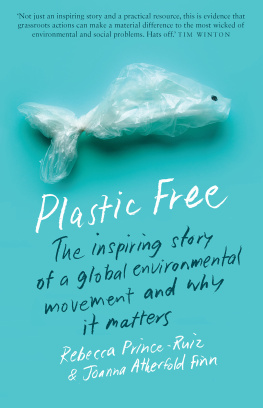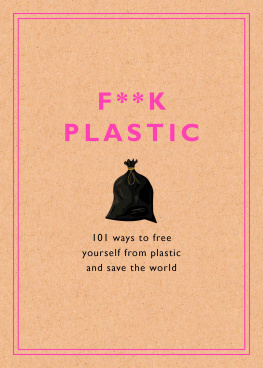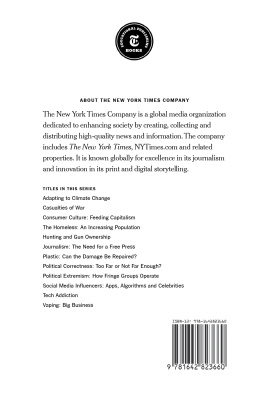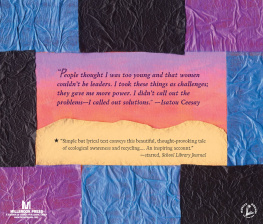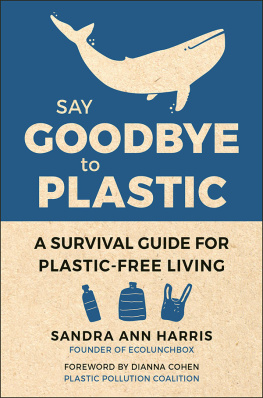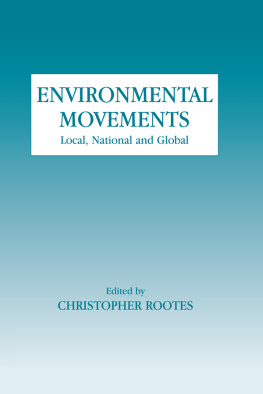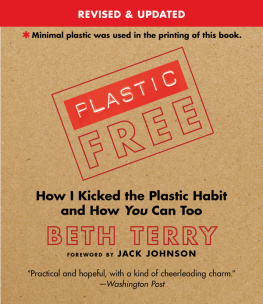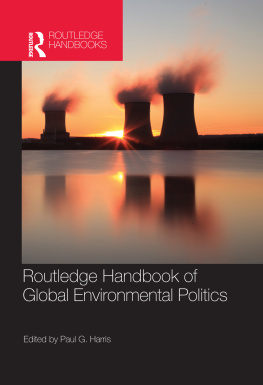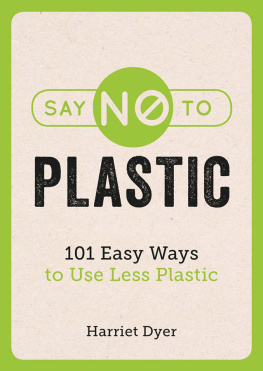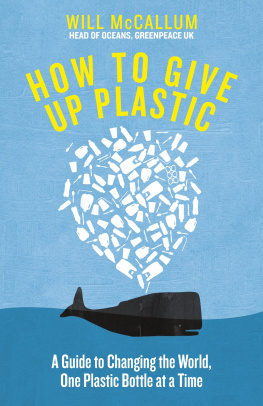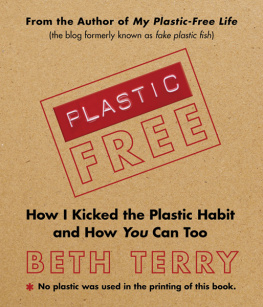Table of Contents
Page List
Guide


Plastic Free
REBECCA PRINCE-RUIZ is the founder of Plastic Free July one of the worlds leading environmental movements empowering people to reduce single-use plastic. Rebecca is Executive Director of the not-for-profit Plastic Free Foundation that has the vision of a world without plastic waste. She has a Bachelor of Science and 25 years of experience in environmental and waste management, community engagement and sustainability behaviour change. Rebecca lives in Fremantle, Western Australia.
JOANNA ATHERFOLD FINNS debut book, Watermark, was published in 2018. Joanna has a PhD in English and has taught creative writing at the University of Newcastle as well as working as a freelance journalist. She lives in Port Stephens, New South Wales.
Plastic Free shows us how to organise around our innate desire for a beautiful, clean environment, and eventually change, in a fundamental way, the system that unnecessarily creates the ugly mess.
Captain Charles Moore, veteran seafarer and author of Plastic Ocean
Few people have spent as much time as Rebecca Prince-Ruiz trying to work out how to minimise the plastic in our lives.
Craig Reucassel, comedian and presenter of War on Waste
Plastic Free shows how one person can ripple out and cause good around the globe. Never has there been a more important time to share hope and action, and combine them for our Mother Earth.
Melissa Joan Hart, actor
A NewSouth book
Published by
NewSouth Publishing
University of New South Wales Press Ltd
University of New South Wales
Sydney NSW 2052
AUSTRALIA
newsouthpublishing.com
Rebecca Prince-Ruiz and Joanna Atherfold Finn 2020
First published 2020
10987654321
This book is copyright. Apart from any fair dealing for the purpose of private study, research, criticism or review, as permitted under the Copyright Act, no part of this book may be reproduced by any process without written permission. Inquiries should be addressed to the publisher.
 | A catalogue record for this
book is available from the
National Library of Australia |
ISBN9781742236551 (paperback)
9781742244884 (ebook)
9781742249407 (ePDF)
Internal design Josephine Pajor-Markus
Cover design Design by Commitee
Cover image Ocean pollution by household garbage, photograph by Andrii Zastrozhnov. iStock
Printer Griffin Press
All reasonable efforts were taken to obtain permission to use copyright material reproduced in this book, but in some cases copyright could not be traced. The authors welcome information in this regard.
NewSouth Publishing sought the most sustainable options available in the printing of this book. It was printed on paper using fibre supplied from plantation or sustainably managed forests, and the cover includes a varnish coating instead of plastic lamination. Where possible, we reduced the use of plastic wrapping in the production and delivery.

Contents
To my mothers, Jean and Leigh
Rebecca
To my parents, David and Vicki
Joanna
Welcome
We are at a unique stage in our history. Never before have we had such an awareness of what we are doing to the planet, and never before have we had the power to do something about that. Surely we have a responsibility to care for our blue planet. The future of humanity and indeed, all life on Earth, now depends on us.
David Attenborough, Blue Planet II
It was billions of micro actions that created the problem and billions of micro actions that can help save it. It all starts with us.
Emily Penn, ocean advocate, skipper and co-founder of eXXpedition
This is a book about how ordinary people can make extraordinary changes. It tells the story of Plastic Free July, a social phenomenon involving over 250 million people in 177 countries. Most importantly, it shows how a determined community can become a formidable force.
It started when I asked a simple question: Im going plastic free next month. Who wants to join me? The small group of people who said yes grew into one of the worlds most successful environmental movements.
Some joined because they wanted to avoid their short-lived plastic bags becoming hazardous baggage for the world or because they were worried about where their disposable coffee cup would end up. Others signed up because they had seen wildlife entangled in plastic and want to leave a different legacy for their children. People everywhere are starting to realise the devastating impacts of our throwaway society and the need to contribute to meaningful change.
Plastic Free is the story of all those who have taken up the challenge and changed their own lives and communities, learning from the stumbling blocks and triumphs of others across the globe. You will meet the resilient friends who went from having no retail experience to setting up a bulk food store. You will find out how a photo of a basket of cups inspired cafs all over the world. You will read how one airline removed 30 million single-use plastic items from its operations in one year alone.
Most importantly, this is not just a story about plastic. It is a story of how to make change and invite its momentum into our lives. Whether you are a student, a parent, an educator, a member of a community group, a change-maker, a business operator, a corporate leader or in government, we hope this story will inspire you to join us and others on the journey toward meaningful change. The question for us isnt What difference can one person make? but How can we continue to create change together?
With so many challenges facing our world, there is too much to lose not to try.
1
The day the penny dropped
A day in June 2011 changed everything.
At an unremarkable, gunmetal-grey building on the outskirts of town, the pace was frenetic. A convoy of trucks emptied their loads and kept going back for more. Inside, the mountain grew. Skilled drivers of front-end loaders scooped up massive bucketloads from the floor and fed them onto a conveyor belt to be transported through machinery for processing. The operation was fast and furious a complex, never-ending, energy-intensive system. Of course, the machines could only do so much. I climbed an industrial staircase and hovered over another scene where the percussive screech was relentless; masked employees in beanies and hi-vis shirts fossicked through the remains of other peoples lives. The work was not only tedious but grimy too. A musty haze lingered in the air and settled on my skin. It was more than that, though. I could feel myself sinking under the weight of what I was witnessing.
I had never known this place existed, had never even thought about it, but I was surely a part of it. Here was the end-of-life point of human production and consumerism, and it was driving so much intensity and effort. This was no dystopian horror story, though there were certainly parallels.

